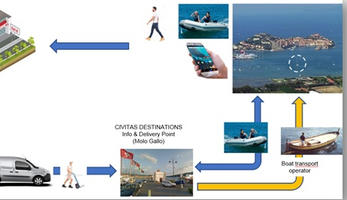Island freight logistics for tourist services
Basic Information
Mobility solution ID
ELB 5.1
Timeline
- complete
Status
ongoing
City
Project
Thematic areas
Demand & urban space management
Behavioural change & mobility management
- Mobility marketing and awareness raising
Summary
This measure aimed to improve the overall quality of life on the Elba Island by reducing air and noise pollution, while also improving the efficiency and reducing the environmental footprint of deliveries to shops and tourist attractions.
Implementing sustainable mobility
As Elba’s proximity to the mainland encourages freight haulers to come to the island using their own vehicles, even for short deliveries, there was a need to limit the number of freight vehicles in circulation as much as possible.
After analysing the island’s logistics needs, Portoferraio and Rio implemented a specialised food and beverage delivery service to hotels, restaurants, cafes. This was done to test a new sustainable way of distributing goods to commercial and tourist businesses.
Freight destined for Elba was collected at a consolidation centre in the mainland city of Piombino, with a single, large commercial vehicle used to take goods to a consolidation centre on the island. From there, small low-emission vans delivered the goods to hotels, restaurants, cafes: this new method optimised efficiency and reduced emissions.
A dedicated service was also organised for deliveries to tourist accommodation - this allowed tourists to receive goods directly in a more sustainable way.
Innovative aspects
The main innovative aspects of this measure are the creation of consolidation centres in Piombino and Elba and the optimised distribution of goods using environmentally friendly commercial vehicles.
Connection to other measures
As far as the increase of goods distribution through consolidation centers is concerned, this measure is connected with the drafting of the Sustainable Urban Logistics Plan. This strategic document is useful for planning sustainable freight and people transport so as to reduce the number of vehicles in circulation and contribute to solving the mobility issues of the territory.
Progress
As the island’s proximity to the mainland encourages freight transporters to come to Elba using their own vehicles, even for short deliveries, there was a need to limit the number of freight vehicles in circulation as much as possible.
After analysing the island’s logistics needs, Portoferraio and Rio implemented a specialised transport service for food and beverage deliveries to hotels, restaurants, and cafés in order to test a new sustainable way of distributing goods to commercial and tourist businesses.
All freight destined for Elba was taken to a consolidation centre in the mainland city of Piombino, with a sole large commercial vehicle then taking the goods to the island. Small low-emission vans then delivered the goods to hotels, restaurants, and cafes: this method optimised efficiency and reduced the environmental impact from vehicles.
A dedicated freight service was also organised to supply tourist accommodation - this allowed tourists to receive goods directly in a more sustainable way.
Innovative aspects
The main innovative aspect of this measure is the creation of consolidation centres in Piombino and Elba and the distribution of goods using environmentally friendly commercial vehicles.
Connection to other measures
As far as the increase of goods distribution through consolidation centres is concerned, this measure is connected with the drafting of the Sustainable Urban Logistics Plan. This strategic document is useful for planning sustainable freight and people transport so as to reduce the number of vehicles in circulation and contribute to solving Elba’s mobility issues.
Outcomes
Reduction of environmental pollution and vehicular circulation
Optimising freight transport patterns and reducing goods circulation on the island helped cut down air and noise pollution.
Sustainable and efficient freight service in peak season
Since hotels, restaurants and cafes use lots of edible and perishable goods, it is very important that the cargo delivery is efficient even during the peak tourist season, given that these businesses are the backbone of the island’s economy.








